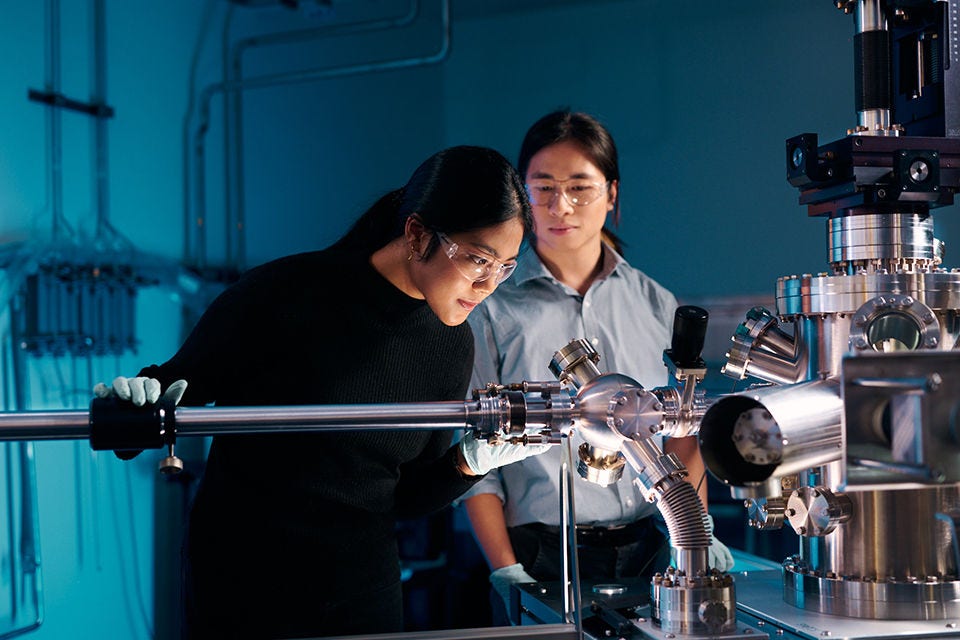
Meet two amazing women in the Science, Technology, Engineering and Mathmatics (STEM) fields...
International students Yi Su and Amali Welgama are joining the ‘STEM revolution’ and making significant contributions to their fields.
Originally from China, Yi obtained a Bachelor of Commerce and Information Technology from Monash University, Melbourne. Amali, who is from Sri Lanka, completed her PhD at Federation University Australia, specialising in agriculture.
Let’s dive into the world of STEM and find out more about how Yi and Amali are making an impact through their work.
What is STEM?
Often described as innovative and dynamic, STEM fields are ever-changing, and home to a rising number of female professionals, students and academics.
STEM stands for science, technology, engineering and mathematics, but these four areas include a very wide range of academic specialisations and professional fields, including:
- Aerospace engineering
- Agriculture
- Biology
- Chemistry
- Engineering
- Information technology (IT)
- Physics
- Statistics
STEM in society
STEM shapes the world around us in amazing ways. Let’s consider agriculture as an example of a STEM field with global importance. Without solid agricultural infrastructure, research and new technologies, we wouldn’t be able to produce the food we need to sustain ourselves.
In fact, it’s the importance of agriculture that attracted Amali to the world of STEM. In her PhD research, Amali studied the management of herbicide-resistant weeds. Herbicides are used to destroy unwanted plants that can threaten crops. So when harmful weeds are resistant to these substances, it can be a major challenge for farmers.
Amali sought to find solutions to this problem, doing ‘hands on’ research in glasshouses (also known as greenhouses) and on farms. She especially enjoyed working directly with farmers and growers out in cropping fields.
Working in or studying STEM can also be more digital in nature. That’s certainly the case for Yi. In addition to studying IT, Yi works at one of the organisations that make up the ‘Big 4’, specialising in cybersecurity, digital identity and access management.
Identity and access management (IAM) is what allows people to securely access important information. An example of IAM is two-factor authentication (such as entering a password and receiving a code via text). Processes like these allow you to access the information you need but also store sensitive data about your identity.
As you can see, STEM industries can be quite varied and highly specialised.
The importance of women in STEM
STEM is a driver of innovation and progression. It’s a key player in making the world a better place for all members of society.
Yi notes that diversity is very important in product design. For example, an all-male design team might create a product design that is ineffective for women. In fact, research has found that women are at a higher risk of severe injury in car accidents because cars are largely designed with men in mind.
Diversity is important in any industry, but particularly those industries rooted in innovation. By having women involved in STEM fields, a wider variety of perspectives, viewpoint and experiences can be considered. Yi believes that women’s contributions in STEM are important for building products that are easy to use for everyone.
The problem?
This sector doesn’t always reflect the diversity of the populations it aims to serve. Specifically, there can be a major gender gap among STEM workers. For example, according to the STEM Equity Monitor 2021, women only make up 28 per cent of professionals working in STEM-qualified jobs.
Future-focused
Fulfilled with their own journeys, both Yi and Amali hope to become female role models and can’t wait to welcome the next generation of women in STEM.
Amali explains that having women in STEM isn’t just important for the industry, it’s important for the women themselves – expanding their horizons in ways they would never expect. Her advice is to always question ‘how’ and ‘why’ and to never be afraid to unleash your true potential. This will not only help the world move forward but will also develop the creative minds needed to address the challenges of the future.
Search for STEM courses in Australia
Head to our Course Search tool and start searching for a course in science, technology, engineering or mathmatics today.


